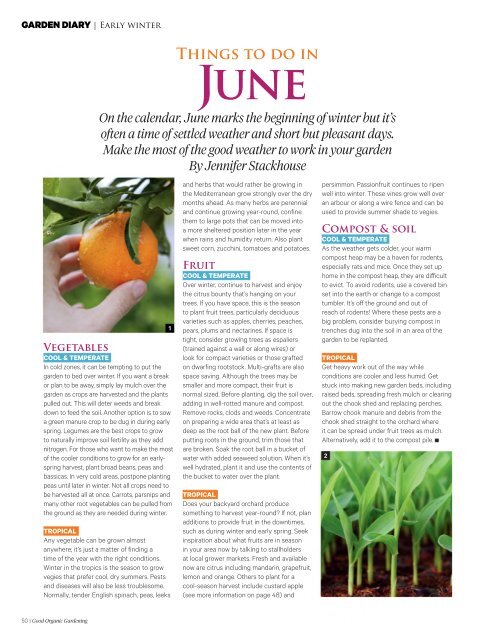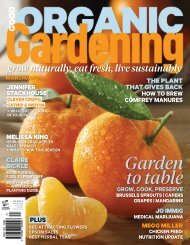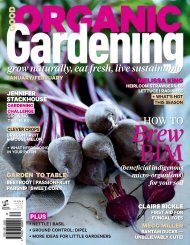3. Good Organic Gardening - May-June 2016 AvxHome.in
3. Good Organic Gardening - May-June 2016 AvxHome.in
3. Good Organic Gardening - May-June 2016 AvxHome.in
You also want an ePaper? Increase the reach of your titles
YUMPU automatically turns print PDFs into web optimized ePapers that Google loves.
GARDEN DIARY | Early w<strong>in</strong>ter<br />
Th<strong>in</strong>gs to do <strong>in</strong><br />
<strong>June</strong><br />
On the calendar, <strong>June</strong> marks the beg<strong>in</strong>n<strong>in</strong>g of w<strong>in</strong>ter but it’s<br />
often a time of settled weather and short but pleasant days.<br />
Make the most of the good weather to work <strong>in</strong> your garden<br />
By Jennifer Stackhouse<br />
Vegetables<br />
COOL & TEMPERATE<br />
In cold zones, it can be tempt<strong>in</strong>g to put the<br />
garden to bed over w<strong>in</strong>ter. If you want a break<br />
or plan to be away, simply lay mulch over the<br />
garden as crops are harvested and the plants<br />
pulled out. This will deter weeds and break<br />
down to feed the soil. Another option is to sow<br />
a green manure crop to be dug <strong>in</strong> dur<strong>in</strong>g early<br />
spr<strong>in</strong>g. Legumes are the best crops to grow<br />
to naturally improve soil fertility as they add<br />
nitrogen. For those who want to make the most<br />
of the cooler conditions to grow for an earlyspr<strong>in</strong>g<br />
harvest, plant broad beans, peas and<br />
bassicas. In very cold areas, postpone plant<strong>in</strong>g<br />
peas until later <strong>in</strong> w<strong>in</strong>ter. Not all crops need to<br />
be harvested all at once. Carrots, parsnips and<br />
many other root vegetables can be pulled from<br />
the ground as they are needed dur<strong>in</strong>g w<strong>in</strong>ter.<br />
TROPICAL<br />
Any vegetable can be grown almost<br />
anywhere; it’s just a matter of f<strong>in</strong>d<strong>in</strong>g a<br />
time of the year with the right conditions.<br />
W<strong>in</strong>ter <strong>in</strong> the tropics is the season to grow<br />
vegies that prefer cool, dry summers. Pests<br />
and diseases will also be less troublesome.<br />
Normally, tender English sp<strong>in</strong>ach, peas, leeks<br />
1<br />
and herbs that would rather be grow<strong>in</strong>g <strong>in</strong><br />
the Mediterranean grow strongly over the dry<br />
months ahead. As many herbs are perennial<br />
and cont<strong>in</strong>ue grow<strong>in</strong>g year-round, conf<strong>in</strong>e<br />
them to large pots that can be moved <strong>in</strong>to<br />
a more sheltered position later <strong>in</strong> the year<br />
when ra<strong>in</strong>s and humidity return. Also plant<br />
sweet corn, zucch<strong>in</strong>i, tomatoes and potatoes.<br />
Fruit<br />
COOL & TEMPERATE<br />
Over w<strong>in</strong>ter, cont<strong>in</strong>ue to harvest and enjoy<br />
the citrus bounty that’s hang<strong>in</strong>g on your<br />
trees. If you have space, this is the season<br />
to plant fruit trees, particularly deciduous<br />
varieties such as apples, cherries, peaches,<br />
pears, plums and nectar<strong>in</strong>es. If space is<br />
tight, consider grow<strong>in</strong>g trees as espaliers<br />
(tra<strong>in</strong>ed aga<strong>in</strong>st a wall or along wires) or<br />
look for compact varieties or those grafted<br />
on dwarf<strong>in</strong>g rootstock. Multi-grafts are also<br />
space sav<strong>in</strong>g. Although the trees may be<br />
smaller and more compact, their fruit is<br />
normal sized. Before plant<strong>in</strong>g, dig the soil over,<br />
add<strong>in</strong>g <strong>in</strong> well-rotted manure and compost.<br />
Remove rocks, clods and weeds. Concentrate<br />
on prepar<strong>in</strong>g a wide area that’s at least as<br />
deep as the root ball of the new plant. Before<br />
putt<strong>in</strong>g roots <strong>in</strong> the ground, trim those that<br />
are broken. Soak the root ball <strong>in</strong> a bucket of<br />
water with added seaweed solution. When it’s<br />
well hydrated, plant it and use the contents of<br />
the bucket to water over the plant.<br />
TROPICAL<br />
Does your backyard orchard produce<br />
someth<strong>in</strong>g to harvest year-round? If not, plan<br />
additions to provide fruit <strong>in</strong> the downtimes,<br />
such as dur<strong>in</strong>g w<strong>in</strong>ter and early spr<strong>in</strong>g. Seek<br />
<strong>in</strong>spiration about what fruits are <strong>in</strong> season<br />
<strong>in</strong> your area now by talk<strong>in</strong>g to stallholders<br />
at local grower markets. Fresh and available<br />
now are citrus <strong>in</strong>clud<strong>in</strong>g mandar<strong>in</strong>, grapefruit,<br />
lemon and orange. Others to plant for a<br />
cool-season harvest <strong>in</strong>clude custard apple<br />
(see more <strong>in</strong>formation on page 48) and<br />
persimmon. Passionfruit cont<strong>in</strong>ues to ripen<br />
well <strong>in</strong>to w<strong>in</strong>ter. These v<strong>in</strong>es grow well over<br />
an arbour or along a wire fence and can be<br />
used to provide summer shade to vegies.<br />
Compost & soil<br />
COOL & TEMPERATE<br />
As the weather gets colder, your warm<br />
compost heap may be a haven for rodents,<br />
especially rats and mice. Once they set up<br />
home <strong>in</strong> the compost heap, they are difficult<br />
to evict. To avoid rodents, use a covered b<strong>in</strong><br />
set <strong>in</strong>to the earth or change to a compost<br />
tumbler. It’s off the ground and out of<br />
reach of rodents! Where these pests are a<br />
big problem, consider bury<strong>in</strong>g compost <strong>in</strong><br />
trenches dug <strong>in</strong>to the soil <strong>in</strong> an area of the<br />
garden to be replanted.<br />
TROPICAL<br />
Get heavy work out of the way while<br />
conditions are cooler and less humid. Get<br />
stuck <strong>in</strong>to mak<strong>in</strong>g new garden beds, <strong>in</strong>clud<strong>in</strong>g<br />
raised beds, spread<strong>in</strong>g fresh mulch or clear<strong>in</strong>g<br />
out the chook shed and replac<strong>in</strong>g perches.<br />
Barrow chook manure and debris from the<br />
chook shed straight to the orchard where<br />
it can be spread under fruit trees as mulch.<br />
Alternatively, add it to the compost pile.<br />
2<br />
50 | <strong>Good</strong> <strong>Organic</strong> <strong>Garden<strong>in</strong>g</strong>
















